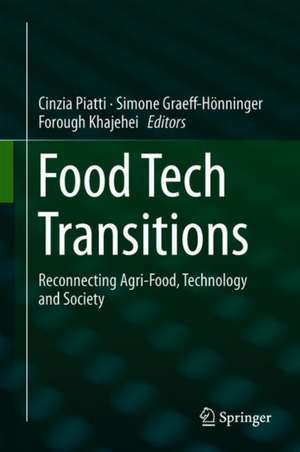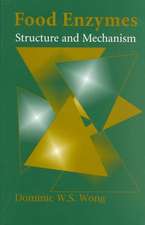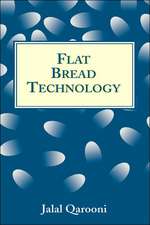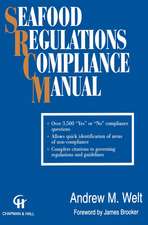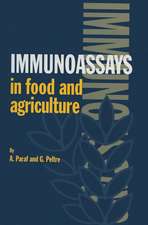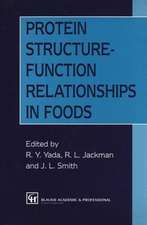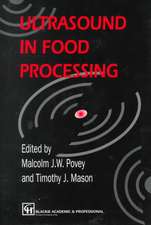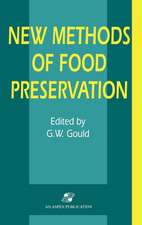Food Tech Transitions: Reconnecting Agri-Food, Technology and Society
Editat de Cinzia Piatti, Simone Graeff-Hönninger, Forough Khajeheien Limba Engleză Hardback – 4 noi 2019
This book is designed to integrate knowledge about food technology within the social sciences and a wider social perspective. Starting with an overview of the technological and ecological changes currently shaping the food industry and society at large, authors tackle recent advancements in food processing, preserving, distributing and meal creation through the lens of wider social issues.
Section 1 provides an overview of the changes in the industry and its (often uneven) advancements, as well as related social, ecological and political issues. Section 2 addresses the more subtle sociological questions around production and consumption through case-studies. Section 3 embraces a more agronomic and wider agricultural perspective, questioning the suitability and adaptation of existing plants and resources for novel food technologies. Section 4 investigates nutrition-related issues stemming from altered dietary patterns. Finally, Section 5 addresses ethical questions related to food technology and the sustainability imperative in its tripartite form (social, environmental and economic).
The editors have designed the book as an interdisciplinary tool for academics and policymakers working in the food sciences and agronomy, as well as other related disciplines.
| Toate formatele și edițiile | Preț | Express |
|---|---|---|
| Paperback (1) | 522.56 lei 6-8 săpt. | |
| Springer International Publishing – 4 noi 2020 | 522.56 lei 6-8 săpt. | |
| Hardback (1) | 698.15 lei 6-8 săpt. | |
| Springer International Publishing – 4 noi 2019 | 698.15 lei 6-8 săpt. |
Preț: 698.15 lei
Preț vechi: 821.35 lei
-15% Nou
Puncte Express: 1047
Preț estimativ în valută:
133.60€ • 138.64$ • 111.67£
133.60€ • 138.64$ • 111.67£
Carte tipărită la comandă
Livrare economică 17-31 martie
Preluare comenzi: 021 569.72.76
Specificații
ISBN-13: 9783030210588
ISBN-10: 3030210588
Pagini: 240
Ilustrații: XX, 174 p. 2 illus., 1 illus. in color.
Dimensiuni: 155 x 235 mm
Greutate: 0.45 kg
Ediția:1st ed. 2019
Editura: Springer International Publishing
Colecția Springer
Locul publicării:Cham, Switzerland
ISBN-10: 3030210588
Pagini: 240
Ilustrații: XX, 174 p. 2 illus., 1 illus. in color.
Dimensiuni: 155 x 235 mm
Greutate: 0.45 kg
Ediția:1st ed. 2019
Editura: Springer International Publishing
Colecția Springer
Locul publicării:Cham, Switzerland
Cuprins
Introduction.- Part I.- Novel food technologies and their acceptance.- Overview on the food industry and its advancement.- Post-harvest treatments and related food quality.- Nutritional and industrial relevance of particular Neotropical pseudo-cereals.- The demand for superfoods – consumer’s desire, production viability and bio-intelligent transition.- Part II.- Altering production patterns in the food industry: 3D food printing.- Food consumption and technologies.- Technologies at the crossroads of food security and migration.- Corporate responsibility in a transitioning food environment: truth-seeking and truth-telling.- Conclusion
Notă biografică
Cinzia Piatti is a research associate in the Department of Social Transformation and Agriculture at the University of Hohenheim in Stuttgart, Germany.
Forough Khajehei is a research associate in the Department of Crop Science at the University of Hohenheim.
Simone Graeff-Hönninger is a professor in the Institute of Crop Science at the University of Hohenheim.
Forough Khajehei is a research associate in the Department of Crop Science at the University of Hohenheim.
Simone Graeff-Hönninger is a professor in the Institute of Crop Science at the University of Hohenheim.
Textul de pe ultima copertă
Technological innovation has been one of the driving forces behind all major shifts in production and consumption patterns. The food industry, predicated on technology and continuous innovation, is now entering a transition age, as scientific advancements restructure what people eat and how people think about food. The editors of Food Tech Transitions provide a critical analysis of food technology and its impact, including the disruption potential of production and consumption logic, nutrition patterns, agronomic practices, and the human, environmental and animal ethics that are associated with technological change.
The book is designed to integrate knowledge about food technology within the social sciences and a wider social perspective. Starting with an introductory section, which provides an overview of the technological and ecological changes currently shaping the food industry and society at large, the book tackles recent advancements in food processing, preserving, distributing and meal creation through the lens of wider social issues, while also analyzing the implications and challenges brought on by rapid change.
Section 1 provides an overview of the changes in the industry and its (often uneven) advancements, as well as related social, ecological and political issues. Section 2 addresses the more subtle sociological questions around production and consumption through case-studies. Section 3 embraces a more agronomic and wider agricultural perspective, questioning the suitability and adaptation of existing plants and resources for novel food technologies. Section 4 investigates nutrition-related issues stemming from altered dietary patterns. Finally, Section 5 addresses ethical questions related to food technology and the sustainability imperative in its tripartite form (social, environmental and economic).
The editors have designed the book as an interdisciplinary tool foracademics and policymakers working in the food sciences and agronomy, as well as other related disciplines.
Caracteristici
Examines the role of technology in food production from a pluralistic perspective, with chapters from experts in sociology, agronomy, nutrition, and ethics Provides a critical analysis of the food security imperative and the issue of food waste Addresses the ecological imperative of the last decades and how it has affected both production and consumption in unprecedented ways
